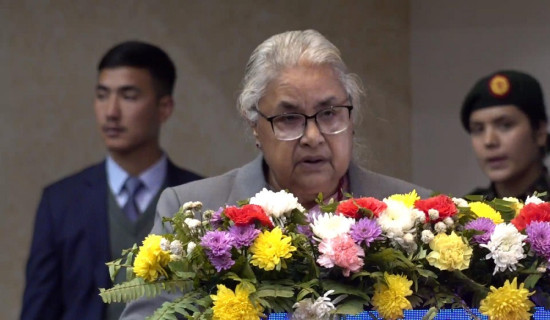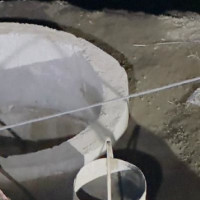- Thursday, 12 February 2026
Legislature's Role Under Scrutiny
Contrary to the public expectations, the federal parliament could not endorse important Bills required to implement the new constitution. Given that the government holds a two-thirds majority in the parliament, it was anticipated that many pending bills would be approved without hindrance. Failure to pass the Bills related to civil service and school education imply the complexity and disagreements over the content. In the absence of Federal Civil Service Law, confusion has prevailed in the formation, operation and conditions of civil service. Matters pertaining to career growth, age limit and entry into the civil service, among others, need to be sorted out in consensus. Teachers have continued to hit the streets of the capital, demanding that the House approve the School Education Bill 2023 immediately.
The winter session, known as ‘bills session’ ran for 61 days and approved only five ordinances substitution Bills and four Bills. The ruling parties got entangled in mustering the support of allies in approving the six ordinances. One ally, the Janata Samajbadi Party (JSP), refused to support an ordinance to amend ‘Some Nepal Acts Related to Land Management.’ As a result, only five ordinances were approved by both Houses of Federal Parliament. The JSP’s support was crucial to approve the land-related ordinance as the NC, UML and other ruling partners lack majority in the 59-member National Assembly.
JSP's stand
Despite repeated requests of Prime Minister KP Sharma Oli and NC president Sher Bahadur Deuba to it, the Madhes-based party declined to go with the government on the controversial ordinance. Instead, the party came up with a study on the said ordinance, stating it creates legal loopholes for arbitrary distribution of public land and destroys the Chure’s ecology with negative repercussions for Tarai belt. The ordinance will benefit the persons close to the government and ruling parties, commission agents and land mafias dead-set on capturing the forests and public lands, the party claims. It was surprising that the JSP, dented by multiple divisions, took a progressive stand on the ordinance. JSP has been often accused of running after power and posts but this stance earned it a positive image.
Four Bills that were first registered in the Upper House have been converted into Acts. They are related to corruption control, electronic transactions, legislation act and safe transactions. The five substitution Bills included ‘Financial Procedures and Fiscal Responsibility (First Amendment) Ordinance, 2081’, ‘Economic and Business Environment Reform and Investment Promotion Amendment Ordinance, 2081’, ‘Privatisation (First Amendment) Ordinance, 2081’, ‘Ordinance to Amend some Nepal Acts related to the Promotion of Good Governance and Public Service Delivery, 2081’ and the ‘Ordinance to Amend some Nepal Acts related to Cooperatives, 2081’.
The opposition heavily came down on the government for unveiling the ordinances by delaying the commencement of the House session. However, the government stated that the ordinances were necessary to fast-track laws to ensure good governance, create an atmosphere for direct investment and pursue sweeping economic sector reforms. The rationale behind the issuance of ordinances was that passage of bills from the House takes a long time and goes through various processes, which can affect the government's proactive bid to revive the economy and deliver goods and services to the people.
One of the achievements of the House session is the unanimous approval of the ‘Corruption Prevention (First Amendment) Bill, 2081.’ It became an Act after it got stuck in the parliament for five years. Corruption has been a cancer, infesting every section of society. The anti-graft Act is expected to maintain fiscal discipline and ethical conduct in administration. Nepal ranks 107th out of 180 countries and territories in the Corruption Perceptions Index of 2024. It scored 34 out of 100, which was 35 points in 2023, one point more than in 2022.
However, the Commission for the Investigation of Abuse of Authority (CIAA) (Third Amendment) Bill is still under consideration in the House. The lawmakers have been divided on a proposal that seeks to bring the policy level decisions of the Council of Minister within the CIAA's jurisdiction. It has been widely assumed that certain decisions of the Cabinet smack of policy level corruption that do not come within the purview of the anti-corruption wing, thereby letting the high-level politicians and bureaucrats involved in such types of decisions off the hook. The new corruption prevention law needs to be enforced in letter and spirit by strengthening the anti-corruption constitutional bodies.
Last July, the Nepali Congress and CPN-UML formed their coalition government, kicking the CPN-Maoist-led alliance out of the government. The parliament’s two largest parties said that they would join hands to constitute the powerful government to deliver stability, promote good governance and give momentum to the stagnant economy. The constitution amendment was another point of their deal, though no concrete steps have been taken to this end so far. Of course, the country has achieved political stability with the formation of the new government. But desired outcomes have not come from the much-touted economic reform agenda.
Growing frustration
The business sector was much happier when a stable government was installed. But the government is still sweating to boost the development budget spending, contain inflation and increase jobs. Sometime back, Finance Minister Bishnu Prasad Paudel admitted that the government was struggling to manage general expenditures as a good chunk of the budget goes to pay public and foreign loans. One main challenge of the joint government is to end the growing frustration engulfing the youths who see their future abroad, not in their motherland. They are leaving the country en masse, causing a labour crisis in cities and villages.
Against this backdrop, the strong government has the numerical strength to endorse scores of Bills without difficulty. The underperformance of the parliament does not bode well when the anti-republican forces have intensified their call to restore the monarchy and Hindu state. The recent pro-monarchical protests are seen as an explosion of piled-up grievances of citizens with the state. This is a writing on the wall. The government requires decisive steps to live up to the public expectations.
(The author is Deputy Executive Editor of this daily.)
















